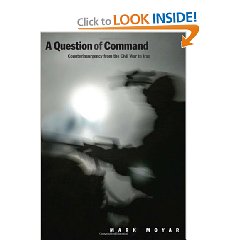
![]() Brilliant but Narrow, Simplifies A Bridge Too Far
Brilliant but Narrow, Simplifies A Bridge Too Far
December 19, 2009
Mark Moyar
EDIT of 21 Feb 2010: A colleague in COINSOC has pointed out that I missed one key aspect of this book and I hasten to add it: “Moyar's point that we are applying peacetime personnel policies by putting people in place based on factors other than their leadership ability and continuing to allow poor leaders even after their capabilities are apparent is a good one though. It's kind of like we are the Titanic and the inertia is too much.” It is an important point. It takes two years to weed out the unfit leaders in a real war, but first you have to admit you are in a real war, and the USA has still not gotten to that point so we are damned on both sides: not taking the fight seriously, and leaving the home front wide open to attack (see my review of Charles Faddis's two books, one on CIA and one on DHS).
I first encountered the author when I read and reviewed Triumph Forsaken: The Vietnam War, 1954-1965, but in ordering this book, took no notice of who the author was, I rarely do, and thus was surprised to discover this is the second work by the author, now at the Marine Corps University where I served as Adjunct Faculty once upon a time.
This book is brilliant and unique in its chosen focus, but I have to leave it at four stars because it simplifies in a manner that is almost neo-conservative in its sharpness.
The single most important insight is that the single most important intelligence quesiton as we get into any insurgency or counter-insurgency is this: who are the elites on either side of the confrontation, how good are they, do they have the special character (that this book helps define), and what does this mean to us?
The problem I have with this book is that it dismisses legitimacy and morality, does not recognize the futility of being on the wrong side of the conflict (as we were in Viet-Nam and have been on hundreds of occasions) or on having ideological traitors or blatantly corrupt self-serving partisan hacks in the White House making decisions that are grounds for impeachment if our flag officers had more character and could remember they swore an oath to uphold the Constitution against all enemies domestic and foreign, not an oath to be blindly loyal to the craven and the corrupt.
Continue reading “Review: A Question of Command: Counterinsurgency from the Civil War to Iraq (Yale Library of Military History) (Hardcover)”



